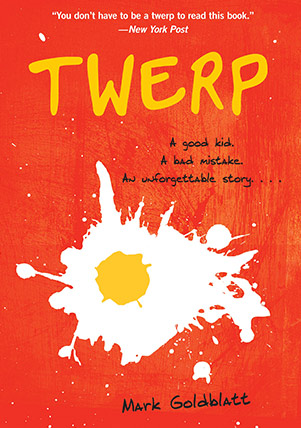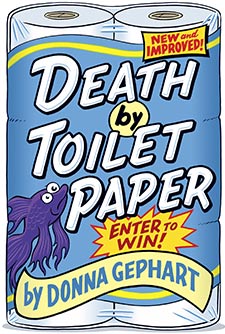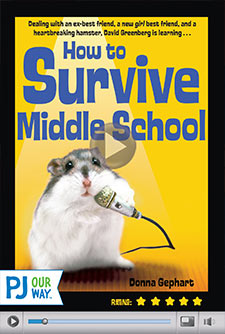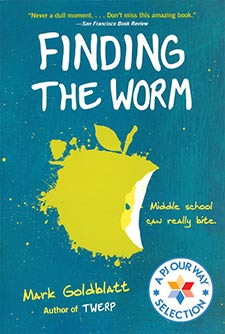Twerp
Julian is about to lose his title of fastest runner in sixth grade and his best friend isn’t talking to him. Could things get any worse?
Average Rating
( hint: Login to leave a review! )
163 Reviews
Leave Review
What the Book is About
Jewish Content & Values
Positive Role Models
Content Advisory
Talk it Over!
More for You
What the Book is About
Julian is a nice kid who's made a big mistake. As part of his punishment, he has to write a journal about what happened. Julian avoids the issue for as long as he can, instead writing in composition notebook after composition notebook about his ill-fated escapades, including his fear that the new boy in school will usurp his title of fastest runner in sixth grade, and his attempt to play cupid for his best friend, Lonnie. A fresh, funny, moving, and realistic picture of a close-knit group of Jewish friends in 1969 Queens, New York.
Jewish Content & Values
- Julian is having lessons for his upcoming bar mitzvah, the age at which a boy assumes adult responsibilities and obligations under Jewish law.
- Lonnie’s mother is a Holocaust survivor. She is religious and goes to synagogue.
- Teshuvah (repentance): Initially Julian tries to avoid taking responsibility for his actions, but over time he comes to feel genuine remorse and learns from his mistakes.
Positive Role Models
- Julian is loyal to his best friend, Lonnie, although Lonnie is quite the troublemaker. As the story progresses, Julian develops his moral compass and realizes that it’s important to do the right thing “because in the end you have to live with yourself.”
- Rabbi Salzburg listens carefully and seriously to Julian’s fairly typical pre-teen problems and offers some simple but helpful advice. He tries to instill a love of Judaism in the boys in his Hebrew school class.
Content Advisory
- A pigeon is injured and dies in the first chapter, and later in the book, a boy with special needs is bullied and hurt. Both scenes are disturbing but help to demonstrate the change in Julian and his personal growth over the course of the book.
- Lonnie’s mother’s tongue was cut in half by the Nazis. The explanation of this, and Mrs. Fine’s difficulty speaking as a result of it, is addressed matter-of-factly by Julian and Lonnie, but it may be upsetting to some readers.
Talk it Over!
Julian does some things that he later regrets out of loyalty to Lonnie, his best friend. Has a friend ever pressured you to do something that made you feel uncomfortable? What did you do?
More for You
Everybody makes mistakes. Repentance (teshuvah) requires us to admit what we did wrong, apologize and mean it, and change our behavior to avoid making the same mistakes in the future. Teshuvah is central to the Day of Atonement, Yom Kippur, the only fast day mentioned in the Torah (first five books of the Bible). In ancient times, Yom Kippur was a day of sacrifices and rituals in Jerusalem’s ancient temple, which was destroyed in the year 70 C.E. Today, it is observed by spending the day in self-reflective prayer and fasting from sundown to sundown, and people often ask forgiveness from those they hurt during the past year.
What the Book is About
What the Book is About
Julian is a nice kid who's made a big mistake. As part of his punishment, he has to write a journal about what happened. Julian avoids the issue for as long as he can, instead writing in composition notebook after composition notebook about his ill-fated escapades, including his fear that the new boy in school will usurp his title of fastest runner in sixth grade, and his attempt to play cupid for his best friend, Lonnie. A fresh, funny, moving, and realistic picture of a close-knit group of Jewish friends in 1969 Queens, New York.
Jewish Content & Values
Jewish Content & Values
- Julian is having lessons for his upcoming bar mitzvah, the age at which a boy assumes adult responsibilities and obligations under Jewish law.
- Lonnie’s mother is a Holocaust survivor. She is religious and goes to synagogue.
- Teshuvah (repentance): Initially Julian tries to avoid taking responsibility for his actions, but over time he comes to feel genuine remorse and learns from his mistakes.
Positive Role Models
Positive Role Models
- Julian is loyal to his best friend, Lonnie, although Lonnie is quite the troublemaker. As the story progresses, Julian develops his moral compass and realizes that it’s important to do the right thing “because in the end you have to live with yourself.”
- Rabbi Salzburg listens carefully and seriously to Julian’s fairly typical pre-teen problems and offers some simple but helpful advice. He tries to instill a love of Judaism in the boys in his Hebrew school class.
Content Advisory
Content Advisory
- A pigeon is injured and dies in the first chapter, and later in the book, a boy with special needs is bullied and hurt. Both scenes are disturbing but help to demonstrate the change in Julian and his personal growth over the course of the book.
- Lonnie’s mother’s tongue was cut in half by the Nazis. The explanation of this, and Mrs. Fine’s difficulty speaking as a result of it, is addressed matter-of-factly by Julian and Lonnie, but it may be upsetting to some readers.
Talk it Over!
Talk it Over!
Julian does some things that he later regrets out of loyalty to Lonnie, his best friend. Has a friend ever pressured you to do something that made you feel uncomfortable? What did you do?
More for You
More for You
Everybody makes mistakes. Repentance (teshuvah) requires us to admit what we did wrong, apologize and mean it, and change our behavior to avoid making the same mistakes in the future. Teshuvah is central to the Day of Atonement, Yom Kippur, the only fast day mentioned in the Torah (first five books of the Bible). In ancient times, Yom Kippur was a day of sacrifices and rituals in Jerusalem’s ancient temple, which was destroyed in the year 70 C.E. Today, it is observed by spending the day in self-reflective prayer and fasting from sundown to sundown, and people often ask forgiveness from those they hurt during the past year.




